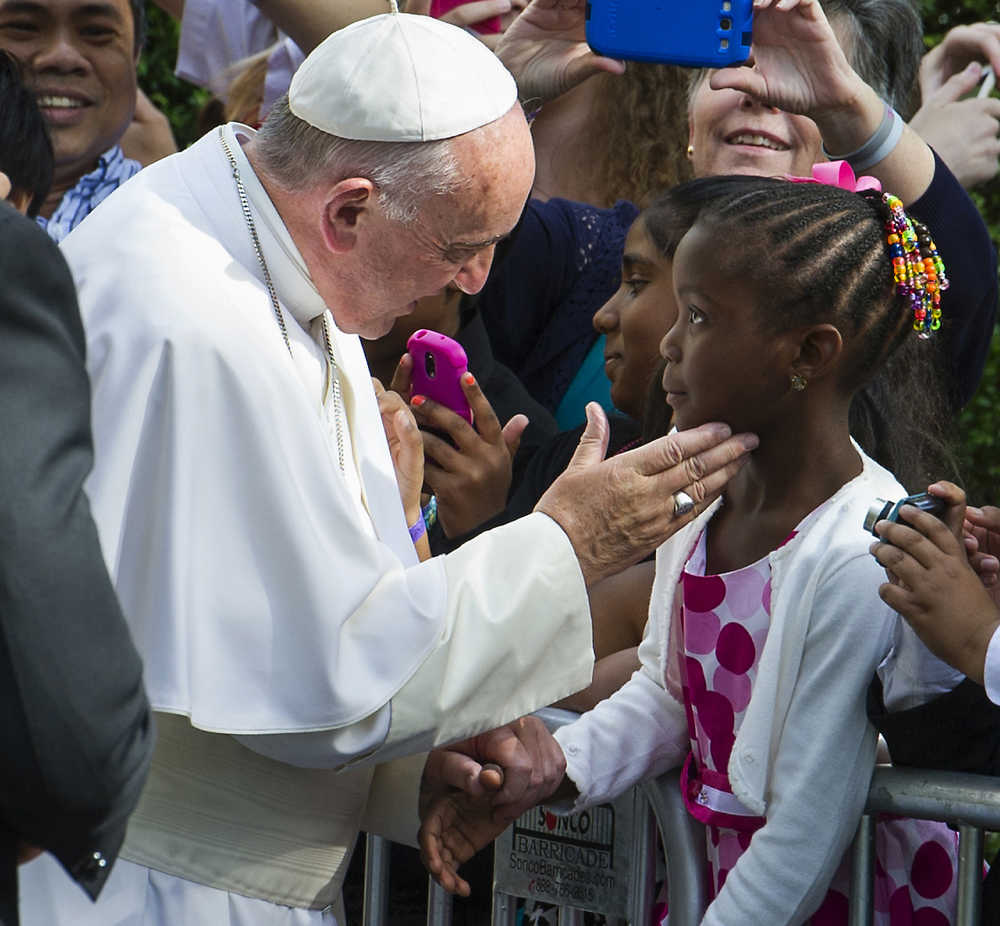LOUISVILLE, Ky. — The private meeting Pope Francis held with defiant Kentucky clerk Kim Davis is a strong papal endorsement of religious resistance to gay marriage, but it doesn’t necessarily mean he approves of how she’s waged her fight, experts said Wednesday.
The Vatican newspaper, L’Osservatore Romano, said their encounter in Washington last Thursday was private. Out of deference to the Vatican, Davis’ attorney, Mat Staver, would not say how it was arranged. The Vatican essentially confirmed it, without further comment.
Davis said she grasped the pope’s outstretched hand, and he told her to “stay strong.”
Davis refused to issue any marriage licenses in Rowan County, Kentucky, rather than comply with the Supreme Court ruling that effectively legalized gay marriage nationwide. She served five days in jail rather than resign. Some of her deputies now issue licenses without her authority, and she claims they are invalid.
“Just knowing that the pope is on track with what we’re doing and agreeing, you know, it kind of validates everything,” Davis told ABC News.
But Vatican observers say that’s reading too much into the visit.
“You can’t take his presence with somebody as his affirmation of everything that they stand for,” said Cathleen Kaveny, a theologian and legal scholar at Boston College. “He thanked her for her courage and told her to stay strong. That’s a commitment to her voice in the conversation. I don’t think it’s necessarily commitment to her policy views.”
Staver’s revelation that Francis met his Apostolic Christian client at the Vatican Embassy after speaking to Congress provided a stunning coda to the pope’s triumphant visit, which ended Sunday.
Francis largely steered clear of culture war issues, telling the U.S. bishops to avoid “harsh and divisive” language despite the challenges they face in society.
From the start of his six-day tour, Francis encouraged Americans to preserve religious freedom, but did so among a list of many other issues.
At the White House, he said “American Catholics are committed to building a society which is truly tolerant and inclusive,” then said “they are likewise concerned that efforts to build a just and wisely ordered society respect their deepest concerns and their right to religious liberty.”
Religious freedom, Francis said, is “one of America’s most precious possessions.”
Still, with much ground to cover during his first U.S. trip, Francis also emphasized immigration, climate change, workers’ rights, the death penalty and war. By reaching above and beyond America’s usual political and social divides, Francis raised questions about whether he prioritizes objections to gay marriage and other laws as much as U.S. bishops do.
U.S. Catholic leaders have increasingly invested in lobbying for accommodations for religious objectors, desperate to preserve the right of faith-based charities, colleges and hospitals to hire, fire, serve and set policy according to church teaching.
The pope also had a private meeting with the Little Sisters of the Poor, a religious order that, along with dozens of dioceses, is suing President Barack Obama over the birth control requirement in the Affordable Care Act, arguing that an exemption for religious objectors is too narrow.
Both meetings help “refute the mistaken idea that the pope was somehow trying to put distance between himself and the current, on-the-ground religious freedom controversies and challenges that the American bishops and others are facing,” said Rick Garnett, a University of Notre Dame law professor who specializes in religious freedom.
Archbishop Joseph E. Kurtz of Louisville, Kentucky, president of the U.S. Conference of Catholic Bishops, referred questions to the Vatican.
Davis and her husband met with the pope for less than 15 minutes, Staver said.
That’s puzzling to Francis DeBernardo, who runs the New Ways Ministry, which seeks acceptance for gay, lesbian, bisexual and transgender Catholics. The pope had turned away a crush of advocacy groups lobbying to see him, and held some meetings, including with donors to Catholic schools and heads of Catholic nonprofits. That he carved out even a few minutes in his event-packed schedule for Davis was noteworthy, DeBernardo said.
“It throws a wet blanket on the goodwill that the pontiff had garnered during his U.S. visit last week,” DeBernardo said.
Two years ago, Francis said “Who am I to judge?” when asked about a supposedly gay priest, but he has also affirmed marriage is between a man and woman. He didn’t emphasize church teaching on marriage during this trip because he wanted to offer a “positive” message about families to America, the Rev. Federico Lombardi, the Vatican spokesman, told reporters.
While flying back to Rome last Sunday, reporters urged Francis to clarify his position on the religious freedoms of government officials. Without mentioning Davis, the pope said, “I can’t have in mind all cases” but called conscientious objection a human right.
“And if a person does not allow others to be a conscientious objector, he denies a right,” Francis said.
Still, Kaveny said none of these comments give any indication that Francis understands the details of Davis’ case, nor do they show how he would balance the conscience rights of a religious objector with the duties of a public official.
“Religious liberty is an important value, but it’s not a value that sits above everything else,” said Kaveny. “The right of conscientious objection isn’t necessarily the right of conscientious obstruction.”
White House press secretary Josh Earnest noted that Obama said this weekend that “our religious freedom doesn’t grant us the freedom to deny our fellow Americans their constitutional rights.”
___
AP Religion Writer Rachel Zoll wrote from New York; Galofaro contributed from Louisville, Darlene Superville from Washington and Nicole Winfield from Rome.

